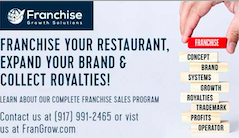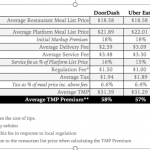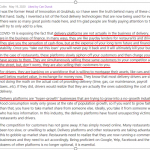8 Key Costs To Consider When Opening A Restaurant
By Gary Occhiogrosso – Managing Partner – Franchise Growth Solutions
Two of the most frequent questions I’m asked at a seminar, workshop, or when teaching a restaurant development course at New York University are; “how much money do I need to open a restaurant, and how do I get the money?” This is the first installment of a two part article answering those questions.
Before we can address how to fund your restaurant, we need first to understand what we’re building and its cost. The type of restaurant you’re opening will determine the amount of money you need. In addition, the kind of restaurant will affect the type of funding and who may have an interest in investing or supplying a loan. Additionally, you’ll need to evaluate how much of your own money you need to provide. That’s because part of the process necessary to convince an investor, banker, or private lender is that you’re genuinely committed to the project. You know the expression, “put your money where your mouth is”
For the sake of this discussion, let’s say you’re opening a fast-casual restaurant. Not a franchise but an independent concept that you have developed on your own. This type of project may require a conventional business loan or an SBA loan. In many cases, investors other than family and friends may not be interested in investing in a brand new concept with no track record of success. It becomes further complicated if this is your first foray into the restaurant industry.
Fast-casual restaurants typically cost between $250,000 and $400,000 to “turn the key” and open the doors for business. The various costs associated with opening a restaurant will range depending on factors such as location, size and condition of the space, everything from security deposits to the reserve capital you’ll need to carry possible shortfalls the first few months you’re open.
Investment Costs to Consider
* Professional fees: This is usually necessary to set up your business entity, whether a corporation or LLC. Also, you’ll want to have a lawyer review any lease you may sign to rent a space where you will construct your new restaurant.
* Security deposits: This may be one to three months of rent paid to your landlord. In addition, many utility companies require deposits to set up electric, water, and Internet connections.
* Equipment: The cost for all of your kitchen equipment. Items include hoods, grills, ovens, stoves, stainless steel prep tables, shelving, hot tables, cold tables, a Point of Sale (POS) system, and a walk-in refrigerator. In addition, small wares, things like scoops, ladles, fry baskets, flatware, dishes, glasses, and other small items you need to prepare your menu and serve your guests. Now let’s move to the front of the house. Additionally, you’ll be looking at furniture and fixtures, countertops, workstations, tables, chairs, decorative shelving, and other items. These are the items you use in the front of the house to create the environment that will best suit the concept you’ve created.
* Leasehold improvements: In most cases, this will be your most significant expense. Leasehold improvements are generally construction costs for electrical installations, hood venting, plumbing, heating, and air-conditioning. These items are referred to as “the mechanicals.” And let’s not forget building one and, in many cases, two ADA-compliant bathrooms. Also, installing the proper ceiling, flooring, millwork, painting walls, and other elements that we typically think of as construction. On a side note, you can take advantage of opportunities due to the abundance of restaurants that have closed during the pandemic. These empty restaurant spaces are referred to as “second-generation restaurant spaces.” You can save thousands of dollars if you find and secure a space that was formerly a restaurant. In many cases, you will find the mechanicals have remained in the building. These second-generation restaurant spaces help to reduces your cost if you don’t need to install a hood, venting, plumbing, electrical, and restrooms.
* Signage: Properly identifying your restaurant will mean you will need to sign for your storefront. Also, consider that you may need lighted signs in the windows and other signage throughout the restaurant.
* Start-up inventory: This is probably the most extensive inventory order you’ll ever place. This initial order is for food, paper, beverages, and other supplies you’ll need in your restaurant daily. You’ll replace these inventory items as you use them, but when you first start, you’ll need to stock your restaurant from scratch with every single thing for the first time.
* Grand Opening Advertising: This is an item that most restaurateurs neglect. You’ll want to launch your restaurant by making a big splash in the neighborhood. To do this, you need the proper budget for social media, print, and other forms of advertising & marketing so you can get the word out.
* Reserve Capital: As I mentioned earlier, you will need to reserve cash in the bank. This reserve cash is required to meet shortfalls that may occur when you first open your new restaurant. You may not break even for months. Therefore, it would be wise to be prepared to cover payroll, inventory, utilities, and other costs incurred as you operate.
Understanding the actual cost of opening your restaurant is vital. An investor or bank will want to see that you’ve applied critical thinking to the project by taking time to evaluate the start-up cost honestly. In addition, you will need to prepare a business plan and projections to secure bank financing or satisfy an investor. Properly evaluating the required investment will lead to accurate budgeting these key startup costs.
So now that you have an understanding of cost, you should be prepared for a banker or investor to inquire how much of your own money you’re willing and able to invest into your business. In many cases, the SBA, private lenders, or conventional loans through a bank will require that you supply somewhere between 15% and 25% of the total amount necessary. As an example, if you project a cost of $400,000 to open your new restaurant, you will need between $80,000 and $120,000 in cash. Your cash investment demonstrates to the bank or investor that you have “skin in the game. “I have never seen a bank or investor finance a new restaurant 100%.
Now that we’ve covered the investment information necessary to open a new restaurant, we’ll tackle the second question in our next article. We’ll dig into funding methods such as a conventional business loan with a bank, an SBA loan, a private investor, and of course, family and friends.
About the Author:
Gary Occhiogrosso is the Founder of Franchise Growth Solutions, which is a co-operative based franchise development and sales firm. Their “Coach, Mentor & Grow Program” focuses on helping Franchisors with their franchise development, strategic planning, advertising, selling franchises and guiding franchisors in raising growth capital. Gary started his career in franchising as a franchisee of Dunkin Donuts before launching the Ranch *1 Franchise program with it’s founders. He is the former President of TRUFOODS, LLC a multi brand franchisor and former COO of Desert Moon Fresh Mexican Grille. He advises several emerging and growth brands in the franchise industry. Gary was selected as “Top 25 Fast Casual Restaurant Executive in the USA” by Fast Casual Magazine and named “Top 50 CXO’s” by SmartCEO Magazine. In addition Gary is an adjunct instructor at New York University on the topics of Restaurant Concept & Business Development as well Entrepreneurship. He has published numerous articles on the topics of Franchising, Entrepreneurship, Sales and Marketing. He was also the host of the “Small Business & Franchise Show” broadcast in New York City and the founder of FranchiseMoneyMaker.com
=====================
FRANCHISE YOUR BUSINESS TODAY: www.franchisegrowthsolutions.com






















